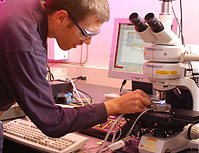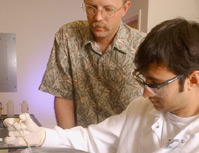INNOVATIONS INDEX

Nanotube Formation
Atlanta (February 10, 2005) — Nanotubes are ubiquitous in the world of science. Although several methods for making them exist, little is known about how these techniques physically produce the hollow fibers of carbon molecules known as nanotubes, that is until now.

Tumor-targeting Nanogels
Atlanta (September 9, 2004) — Painful and damaging chemotherapy may one day be a thing of the past. Researchers at the Georgia Institute of Technology and Purdue University have developed nano-sized particles that can target and trick cancer cells into absorbing them.

The Origin of Life
Atlanta (May 11, 2004) — Researchers at Georgia Tech have discovered a crucial link in the early history of RNA, a molecule that many scientists believe was the first form of life on Earth.

Will Robots Replace Humans?
Atlanta (March 14, 2004) — When most people think of robots, they envision Hollywood images of robots with superhuman powers — oftentimes humanoids with superior intelligence and strength. The reality, however, is quite different from these fantastic visions.

Bioremediation
Atlanta (January 20, 2004) — Research conducted at the Georgia Institute of Technology has revealed a new approach for cleaning sites contaminated by toxic solvents — using nature's own bacteria to do the job.

An Eye on Adaptive Computing
Atlanta (February 2003) — With more people than ever facing the threat of vision impairment from eye disease, engineers at Georgia Tech and physician scientists at the Bascom Palmer Eye Institute in Miami are working to understand the strategies that people with visual impairments exhibit while using computers.

Wearable Computing
Atlanta — Thad Starner is a guru of sorts when it comes to wearable computing. Several of his graduate students in the College of Computing at Georgia Tech also use wearable computers on a daily basis. For these researchers, however, a wearable computer is not just the newest gadget or high-tech status symbol, but a driving force in their computer research — how to build computer applications that make the user smarter and more efficient in completing day-to-day tasks.

The Home of the Future
Atlanta (December 1, 2001) — As the number of senior adults grows, more families grapple with how to care for older parents. To address this growing concern, Georgia Tech researchers are exploring ways to use the latest in home technology to help senior adults remain in their homes and maintain their independence as long as possible in the Aware Home Research Initiative (AHRI).

Blue Lasers
Atlanta (October 1, 2001) — William S. Rees Jr. imagines a future where we will carry all of the information that we would ever need — our driver's license, credit cards, security codes, even our mother-in-law's phone number-on a CD-like disk the size of a dime.


